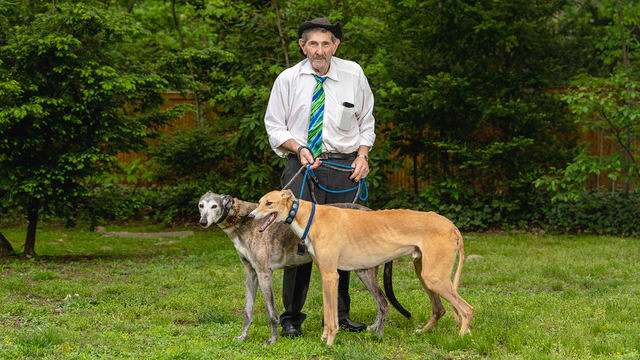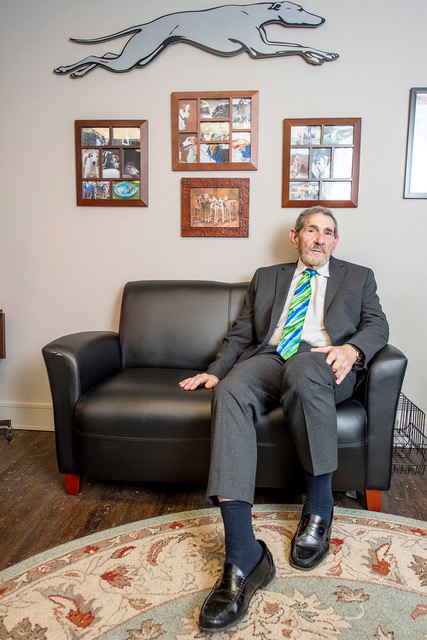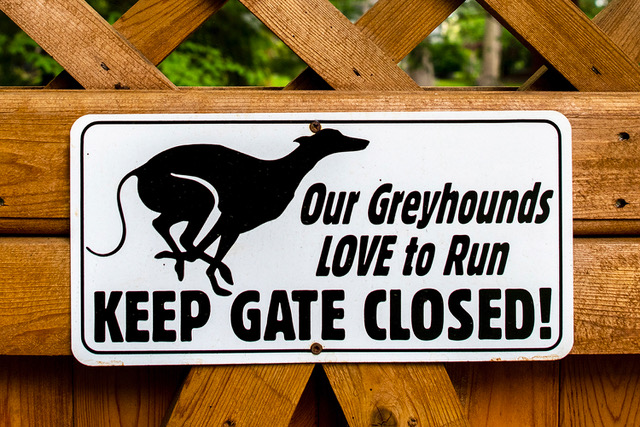The dog's ferocious. So is his lawyer.
You might think representing animals would be a warm and cuddly line of work. You probably haven't met Richard Rosenthal.

A free daily email with the biggest news stories of the day – and the best features from TheWeek.com
You are now subscribed
Your newsletter sign-up was successful
The case before the court involved a Rhode Island greyhound named Lexus, accused of killing a Pomeranian in a dog park. The prosecution was asking for the death penalty, and a lawyer for the defense, Richard Rosenthal, was there to stop it.
It soon became clear that the defense was prepared to exhaust every possible legal means to free the greyhound — to turn it, in Rosenthal's words, into a "federal case." So Lexus was granted a stay of execution, but on the condition that Rosenthal remove the greyhound from the state "by the most direct route without stopping, never to return." This was his first case as a dog lawyer, and what he calls his first "get-out-of-town-by-sundown order." It would be the first of many.
As an animal attorney for more than a decade, Rosenthal takes on custody cases, sues veterinary clinics for malpractice, and has made a specialty of defending dangerous dogs. In doing so, he often enrages local officials, animal control officers, and district attorneys. But even animal rights groups have expressed frustration with him.
The Week
Escape your echo chamber. Get the facts behind the news, plus analysis from multiple perspectives.

Sign up for The Week's Free Newsletters
From our morning news briefing to a weekly Good News Newsletter, get the best of The Week delivered directly to your inbox.
From our morning news briefing to a weekly Good News Newsletter, get the best of The Week delivered directly to your inbox.
"I'm a hired gun," Rosenthal said, acknowledging his reputation as the go-to lawyer to get dogs off death row. "If I take a case, it's about winning. I take it because I believe in it."
Lexus the greyhound's case was a turning point for Rosenthal. After that, he and his wife, Robin Mittasch, founded the Lexus Project in 2009, a nonprofit that provides legal representation for dogs ordered to be euthanized. It turned out there was a market for his services. He soon received a phone call about Luna, a husky ordered to be put down for killing chickens. He was called to Connecticut to defend a golden retriever named Buddy.
That case played out dramatically in the local papers. Buddy had knocked down an older woman, and the woman's son wanted Buddy put down. The Lexus Project issued an over-the-top response on Facebook, posting images of the gates of Auschwitz superimposed over the town seal of Milford, Connecticut ("I can't say enough bad things about Connecticut," Rosenthal said. "They've never met a dog they didn't want to kill.") A judge granted Buddy a reprieve, provided the Lexus Project removed the dog from Connecticut immediately.
Word got around. Cases began flooding in from around the country. One in particular inspired Rosenthal to abandon his 30-year family and criminal law practice to go into animal law full time.
A free daily email with the biggest news stories of the day – and the best features from TheWeek.com
It is not remotely a feel-good story. The case involved an enormous dog in Nevada named Onion, a 120-pound mastiff–Rhodesian ridgeback mix. Onion killed his owner's 1-year-old grandson after the child stumbled and startled the sleeping dog. Rosenthal and a local lawyer argued that the dog was not vicious but had reacted the way any animal might when startled. The case went to the Nevada Supreme Court. There, the child's grandmother made it clear she didn't want the dog euthanized; despite losing her grandson, she had a strong attachment to the dog, which she adopted as a puppy when she received a cancer diagnosis. Eventually, the county dropped the case rather than force the grieving family to appear in court, and Onion was sent to a rescue sanctuary in Colorado.
"In Onion's case, it was an unfortunate accident," Rosenthal said. "It was a horrible tragedy. But there was nothing vicious about it."
In such cases, Rosenthal employs the same dispassionate legal argument every time. He allows that it is a tragedy when a dog injures or kills another dog or, worse, a person; but he says all circumstances must be considered before the dog is euthanized. It's a position that doesn't always play well with the public. "With Onion, we got hate mail," he said. "We got death threats."

The history of animal law in the United States can be reasonably traced to a landmark 1972 case brought by a constitutional lawyer named Henry Holzer, who sought to end kosher slaughter, a practice that he argued did not render livestock unconscious before killing them. Holzer lost the case, but it was the beginning of a new wave of lawsuits that protected the interests of animals, rather than simply a person's interest in relation to an animal.
Soon after, Helen Jones, a founder of the Humane Society of the United States, sought to shut down three New York City zoos. In 1975, the first animal law class was offered at Seton Hall Law School in New Jersey. The specialty quickly expanded to address animal abuse, laboratory testing, captive animals, wildlife, and companion animals. In 1979, a network of animal lawyers created the Animal Legal Defense Fund, which focuses on both litigation and advocacy. The ALDF currently has over 2,600 pro bono attorney members.
Today, animal law is expanding rapidly. More than 160 law schools in the United States offer at least one animal law class; the Lewis and Clark Law School in Portland, Oregon, has the most extensive program, with 25 animal law courses. More law schools are following suit: In 2021, Harvard Law School's Animal Law and Policy program received a $10 million endowment. Last month, the George Washington University Law School and the Animal Legal Defense Fund teamed up to open a new animal law program.
Thompson Page, an animal attorney in Connecticut, regularly serves as co-counsel with Rosenthal (who is licensed to practice only in New York and several federal districts). He and Rosenthal founded the Center for Animal Litigation, a nonprofit network of lawyers that, like the Animal Legal Defense Fund, works pro bono on animal cases around the country.
"It's David versus Goliath every day," Page said. "We are civil rights lawyers for four-legged creatures."
The two men have been friends for years, and Rosenthal is described by Page as having a "creative legal mind" with a deep understanding of the law and how to apply it. Page points out that endangered species and farm animals often get the most legal attention and, to some extent, public sympathy.
Page points out, however, that he and Rosenthal occupy an unpopular space in animal law: "Who do you think wants to represent a pit bull who bit somebody?" Rosenthal has a knack for getting judges — many of whom are eager to dismiss lawsuits against dogs as frivolous — to consider the details of the case with what Page calls "enthralling colloquies" that can go on for hours.
Though some animal rights activists consider Rosenthal an ally, he is aware that he has made enemies along the way. He says that local government officials, law enforcement, and opposing counsel tend to dislike him. But it is part of the job, Page says. "We're hated," he said. "We are Darth Vader."
Both Rosenthal and Page expressed distrust of law enforcement. "All of a sudden it came to a point where, invariably, when a cop shoots a dog, their first description of the dog, no matter what the dog is, is that it was a pit bull," Rosenthal said. (The Justice Department estimates that police officers kill 10,000 pet dogs every year.) Historically, animal control officers, once referred to as "dogcatchers," have been in generally low-paying, low-level positions. Rosenthal may be willing to entertain a comparison to Darth Vader, but he holds the modern dogcatcher in an even lower regard. "Let's get serious," he said. "Nobody becomes an animal control officer for the glory or the money or the great amount of respect."
But the job has evolved, and now animal control officers, who are often considered part of law enforcement, have a considerable influence on what happens when a dog bite is reported. They are often primary defense witnesses when a kill order has been enacted for a dog. "We want animal control officers to actually have training in dog behavior so they understand why and when dogs fight," Page said.
"There are documented cases where it's the smaller dog that starts the attack," Rosenthal said. "You can't expect a dog to have a proportional response." He describes an incident involving a greyhound that killed a lap dog that had jumped out of its owner's arms and run barking toward the greyhound. He was able to prove that the smaller dog initiated the interaction, citing a case out of Illinois that says the court must look at provocation from the dog's point of view and using a "reasonable dog standard." The case was dismissed.
"To break the ice, my normal first offer of settlement is if you want to take the kill order off the dog and reissue it on the owner, I'll serve it," Rosenthal said. He was joking, although he didn't exactly laugh.

Leaning back in a chair in his Long Island basement office, Rosenthal is at ease discussing acrimonious cases he has worked on, slipping in barbs aimed at bad dog owners, opposing counsel, judges. About a judge he has worked with: "You could put her legal argument on the head of a pin and still have room for the angels to dance."
The office looks like that of a standard lawyer — save the large sculpture of a greyhound next to his phone, a wall hanging depicting a greyhound, and dozens of framed photos of greyhounds. When recounting the story of saving Lexus, Rosenthal became uncharacteristically emotional. It happened that one of his greyhounds had died the previous week.
Rosenthal and his wife, Mittasch, are well known within the greyhound adoption community. In addition to his founding of the Lexus Project, Rosenthal is a licensed pilot who tells stories of using his personal aircraft, a single-engine ex-military Navion F, to transport dozens of dogs from shelters to adopters. He has also flown with Pilots N Paws, an organization that enlists private pilots to help with rescued-animal transportation. He no longer flies these transport missions, however. In 2017, Rosenthal was the sole survivor of a Long Island plane crash that killed the two other passengers on board. There were no animal casualties, but he has not flown since the crash.
Rosenthal estimates that he takes 20 to 30 animal cases per year. Aside from handling general counsel work for several doctor's offices on Long Island, pet-custody cases are where Rosenthal makes his money. "Pet custody starts at around five grand and can get to ridiculous numbers when you have two sides with two attorneys willing to fight," he said.
But there are obstacles to being a dog lawyer. Courts generally do not grant animals habeas corpus, or the right to a trial — a significant barrier to litigating animal law. Recently, a high-profile case surrounding Happy, an elephant at the Bronx Zoo, brought the issue of personhood into public view and tested the boundaries of applying human rights to animals. Advocates at the Nonhuman Rights Project, the organization representing Happy, argued that the elephant recognizes her reflection in a mirror, indicating she has self-awareness and consciousness and should be released from captivity to an elephant sanctuary. The New York Court of Appeals rejected the argument, ruling 5-2 that Happy is not a person, at least not in the legal sense.
This is where progressive animal law theories and Rosenthal's approach diverge. He is quick to draw a distinction between successful litigation and advocacy that relies on animal law to change court definitions of personhood, an effort that he deems an "intellectual pursuit."
"I am an oddity in animal law in the sense that the holy grail of the animal law is to have animals declared something other than just property," he said. "What I argue and litigate are strict property concepts." Litigating animals as property may seem at odds with the ideal of fighting for their rights, but it is often the most efficient way to save the life of a dog.
Unlike the yearslong case pushing for the personhood and release of Happy, Rosenthal's approach to animal law feels urgent. He said he doesn't have time to try to convince the court of an animal's personhood. "The difference is, in my cases, there is a dog or cat that's going to die if I don't win," he said. "So to me, I need to win the case."
This article was originally published by The New York Times. Used with permission.